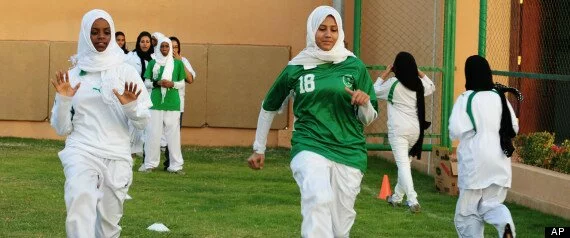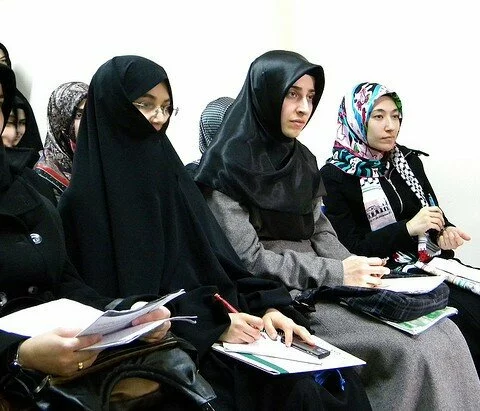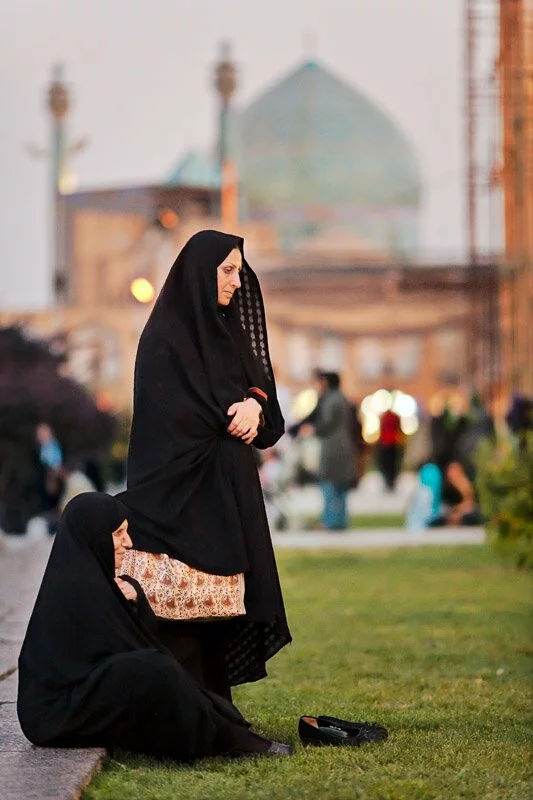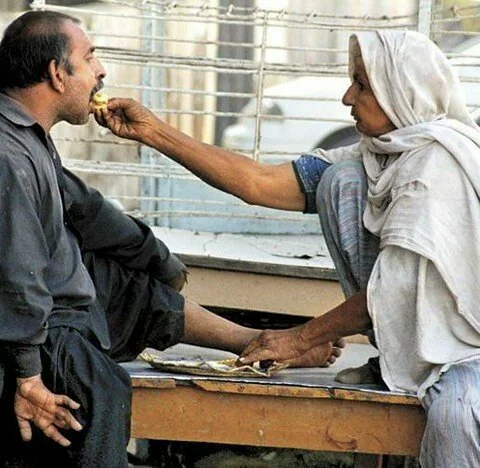Saudi Arabia Olympics: Islamic Kingdom To Allow Women Athletes To Compete In London
 In this undated photo provided by Reema Abdullah, members of the Jeddah Kings United all female team attend football exercise in Jeddah, Saudi Arabia. (AP Photo/Courtesy of Reema Abdullah)
In this undated photo provided by Reema Abdullah, members of the Jeddah Kings United all female team attend football exercise in Jeddah, Saudi Arabia. (AP Photo/Courtesy of Reema Abdullah)
RIYADH, June 25 (Reuters) – Saudi Arabia will enter women athletes in the Olympics for the first time ever in London this summer, the Islamic kingdom’s London embassy said on Sunday.
Human rights groups had called on the International Olympic Committee to bar Saudi Arabia from competing in London, citing its failure ever to send a woman athlete to a Games and its ban on sports in girls’ state schools.
Powerful Muslim clerics in the ultra-conservative state have repeatedly spoken out against the participation of girls and women in sports.
In Saudi Arabia women hold a lower legal status to men, are banned from driving and need a male guardian’s permission to work, travel or open a bank account.
Under King Abdullah, however, the government has pushed for them to have better education and work opportunities and allowed them to vote in future municipal elections, the only public polls held in the kingdom.
“The kingdom of Saudi Arabia is looking forward to its complete participation in the London 2012 Olympic Games through the Saudi Arabian Olympic Committee, which will oversee the participation of women athletes who can qualify for the games,” said a statement published on the embassy website.
In April the head of the kingdom’s General Presidency of Youth Welfare, the body that regulates sports in Saudi Arabia, said it would not prevent women from competing but that they would not have official government endorsement.
The IOC said on Monday that talks with the Saudis were “ongoing” and that “we are working to ensure the participation of Saudi women at the Games in London”.
The head of the kingdom’s Olympic mission, Khalid al-Dakheel, told Reuters on Sunday evening however he was unaware of any developments allowing women to participate.
Top Saudi clerics, who hold government positions and have always constituted an important support base for the ruling al-Saud royal family, have spoken against female participation in sports.
In 2009 a senior cleric said girls risked losing their virginity by tearing their hymens if they took part in energetic sport.
Perhaps the most likely woman candidate to compete under the Saudi flag in London, equestrian Dalma Malhas, represented the kingdom at the junior Olympics in Singapore in 2010, but without official support or recognition.
Physical education is banned in girls’ state schools in the kingdom, but Saudi Arabia’s only female deputy minister, Noura al-Fayez, has written to Human Rights Watch saying there is a plan to introduce it. (Reporting by Angus McDowall and Asma Alsharif; editing by Andrew Roche)
Women Rights as a mother in Islam
Women have been given great importance and value in Islam. Their role as a mother has greatly been admired by Islam. Woman is the one who has to suffer for nine months to bring her child into the world. Her job does not only end there. She cares for her child, spends sleepless nights just for the comfort of her baby, nurtures him, and teaches him moral values among many other things.
In Islam the noblest thing is satisfying and caring for one’s parents. Mother has been given three times more importance than the father. Therefore, in Islam, every day is like a mother’s day and we always have to care and respect our parents and never even bristle. The Muslim woman enjoys great security and care as a mother from the hands of her child. In Islam it is said that if one’s mother dies, he has to fulfill the vows he had made to his mother before her death. The importance of caring and respecting mother is clear from the Hadith narrated by Jahmah:
I said to the Holy Prophet, “O Messenger of Allah, I desire to go on a (military) expedition and I have come to consult you.” He asked me if I had a mother, and when I replied that I had, he said, “Stay with her because Paradise lies beneath her feet”.
Let us turn the table now. Charity begins at home you must have heard and this is exactly that one should do and act. Muslim woman should very well know this and try to implement in their lives. It is not only the children who should respect and honor you but it should be you who should present yourself in such a way that they are compelled to love you.
If you want your children to be respectful to you then you will have to teach them right from the beginning. Help them learn and educate them with latest technology but do not neglect to transfer your traditional and cultural values. Let their Islamic concept be clear and they should know what Islam is teaching about the rights and duties, afterwards expect them to become good Muslims and loving son or daughter. As a woman, you have this key role of nurturing and raising a human being according to the teachings of Quran and Sunnah. Therefore, if you have neglected your duties under any circumstances you may not retain the right to complaint afterwards.
Understanding the Verse of ‘Beating Women’ in the Qur’an
Introduction:
الرِّجَالُ قَوَّامُونَ عَلىَ النِّسَاءِ بِمَا فَضَّلَ اللَّهُ بَعْضَهُمْ عَلىَ بَعْضٍ وَ بِمَا أَنفَقُواْ مِنْ أَمْوَالِهِمْ فَالصَّلِحَتُ قَنِتَاتٌ حَفِظَتٌ لِّلْغَيْبِ بِمَا حَفِظَ اللَّهُ وَ الَّاتىِ تخَافُونَ نُشُوزَهُنَّ فَعِظُوهُنَّ وَ اهْجُرُوهُنَّ فىِ الْمَضَاجِعِ وَ اضْرِبُوهُنَّ فَإِنْ أَطَعْنَكُمْ فَلَا تَبْغُواْ عَلَيهْنَّ سَبِيلاً إِنَّ اللَّهَ كاَنَ عَلِيًّا كَبِيرًا
“Men are the guardians of women, because God has given advantage to some people over another, and because they spend from their wealth. Consequently, pious women are obedient [to their husbands] and keep their secrets for God also keeps secrets. And as for those from whom you fear rebellion, admonish them [first] and [next] refuse to share their beds and [even then if they do not listen] beat them. Then if they obey you, take no further action against them. Indeed, God is Exalted and Mighty.” – Al Nisa’ 4:34
The above is one of the verses of the Qur’an that many Muslim scholars normally need to explain, clarify and justify in length for their Muslim and non-Muslim audience. At the face of it the verse seems to simply advise men to beat their wives if they do not obey them. It is very normal that in our era this can easily become a controversial issue.
When I was explaining this verse for a group of Muslims a while ago, a very respected lady who herself was a very devoted Muslim asked me how this verse could be best explained for others, especially for non-Muslims who were coming from a totally different background. I found this to be a very valid and relevant question and thought I should write something in response to it. This article is my attempt in answering that question.
I would like to make it clear from the outset that the aim of this article is not at all to defend or justify the verse. The only aim of this article is to explain it so that the reader understands the verse and its implications more thoroughly.
Another point to clarify at the start is that this article is focusing on the part of the verse that instructs about beating disobedient wives (underlined in translation). The earlier parts of the verse will be discussed, where related, only to explain the latter part of the verse but will not be elaborated in detail as they are not the subject of this article.
There are two extreme approaches in explaining and justifying the verse of beating wife in the Qur’an:
a. To say that this is God’s directive and therefore it does not need to be an issue to discuss. We therefore only need to obey it.
While it is a fact that for a Muslim, God’s directives in the Qur’an are to be obeyed with no hesitation, I think it is the right of us as human beings to demand explanation and clarification about any verse of the Qur’an and in fact, the Qur’an itself has advised us to think and ponder over its meanings. Avoiding such demands and questions can only result in ignorance or arrogance, both of which will ultimately be destructive to Muslims and their faith.
b. The other approach is to eliminate the question by trying to argue that the word that is traditionally translated as “beat them” in this verse really has a different meaning.
I have not found any reliable basis for the above argument. I think it is very clear from the way Arab uses the word that the verse is indeed referring to ‘beating women’ and not anything else.
After the above introduction, I would now like to proceed with the main body of this article that is explaining the verse of ‘beating women’ and its implications. In order to be as brief and as clear as possible, I am going to do this in a series of short bullet points.
Understanding the verse:
1. Before any attempt to understand the verse on beating the wife it is very important to first understand the logic behind it. In the Abrahamic religions (not just Islam) family unit is considered as a social unit that like any other social unit needs leadership and this leadership for the reasons that are described in the verse[i] is given to men. It is beyond this article to explain this further but this perspective needs to be appreciated if we want to understand the verse correctly. Verse 34:4 starts by referring to this fact and is based on this foundation.
2. Appreciating the above, we can now understand what ‘Nushuz’ in the verse means. ‘Nushuz’ is coming from the root ‘Nashz’ which means an elevated land and its derivatives are used for the meaning of ‘rising up’. The word, like most other words and like in any language, will find its exact meaning when it is interpreted within the context. In the context of the verse under discussion, and considering the last point, the word means uprising and defying authority. Nushuz here means a woman who rejects the God given authority of her husband in being her guardian.
3. What we learn from the above is that Nushuz does not mean having a different opinion. It does not mean disagreeing either. Even occasional disobedience of a wife towards her husband by itself cannot be called Nushuz. Nushuz refers to a much more serious concept, that is, rejecting the authority of the husband (as given by God). Difference of opinion, disagreeing and occasional disobedience are not the same as rejecting the authority altogether.
4. It needs to be understood that the verse has not given a religious instruction. This can easily be appreciated by those who are familiar with the style of the Qur’an and the style of the classic Arabic language. This is a very important point to understand. It is not that husbands are obliged by this verse to beat their wives if the conditions were met. It is not like if a husband decides not to beat his rebellious wife that means he is disobeying God. It is therefore not correct to say that the Qur’an has ‘instructed’ to beat wives.
5. Once the above very important point is appreciated, we can easily appreciate that the verse under question has merely addressed a family issue by giving a solution that was best suited for the socio cultural conditions of the time and the land. This is very much similar to the verse of the Qur’an in the same Sura that advises and permits men to marry up to four women to address the issue of protecting orphans’ rights (4:3)[ii].
6. In the Sura of Nisaa the verses that are addressing the issues related to the husband and the wife are to protect the structure of the family and its sanctity and (in line with this) to bring peace (Islaah) between the couples (as explicitly referred to in the verse 4:35). This means the husband is not supposed to beat his wife to fulfil his anger or to humiliate her. This not only is forbidden, but also works quite contrary to the above purpose, that is protecting the family and bringing peace.
7. Appreciating the above, the husband needs to (and in fact is obliged to) think carefully about the consequences of any reaction he might take in trying to correct his rebellious wife. He should wisely use only those measures that he knows will work. He should avoid those measures that he thinks may make the situation worse, even if these are the measures that are given in verse 4:34.[iii]
8. It needs to be appreciated that the advice of beating is only applicable if the earlier two advises did not work. This means in his attempt to correct his rebellious wife, according to the verse, the husband can only use ‘beating’ if ‘admonishment’ and ‘refusing to share bed’ does not work.
9. The best follower of the Qur’an is the Prophet (pbuh). First, we do not have any narrations that suggest that the Prophet (pbuh) ever beat his wife[iv]. Second, we have a number of narratives reporting that the Prophet (pbuh) limited beating to a hit that is not severe[v] (does not leave mark) and is not on the face. In explaining this Ibn Abbas has given example of a hit that is as light as striking with a toothpaste (that at the time of the Prophet – pbuh – was a very tiny short piece of wood, hardly capable of creating any pain)[vi]. Considering this, the beating is not to punish or to change the attitude of the wife by causing her pain. Rather, it is only a gesture of disapproval and dissatisfaction and reclaiming the right as the head of the family.
10. It needs to be appreciated that the verse is not advising about a permanent attitude by the husband. There can only be two possibilities. One is that the solution of beating wife works in which case, as the verse instructs at the end, the husband should fear God and should refrain from any further actions. The other possibility is that beating does not work, meaning, the wife continues to be totally rebellious to her husband’s authority and the husband’s beating her does not help at all. This is the case of serious difficulty between the couple and can result in their separation. In this case verse 4:35 (the verse after the verse of beating) advises that the help should be sought from relatives of the both sides. Therefore the beating that the verse is referring to is simply a one off measure. No man can use this verse to justify a regular attitude of aggression towards his wife.
11. One of the most important obligations of a Muslim is to follow the agreements. By being a resident of a country or by being allowed to enter a country, the person has entered an agreement to obey the rules of that country. If according to the regulations of the country even a slight beating of the wife (as explained in point 9) counts as domestic violence and is illegal, then the husband should respect this rule and observe it.
12. An objection that is sometimes made is that in verse 4:128 the wife is advised to settle on a compromise with her husband if she fears of the husband’s ‘Nushuz’. The objection is that why in the case of the wife having Nushuz the husband is allowed to beat her but in the case of the husband having Nushuz the wife is advised to have leniency. Justified as it might seem, the objection is based on a totally wrong assumption. The wrong assumption is that the Nushuz in verse 4:34 is of the same level as the Nushuz in verse 4:128. I mentioned in point 2 that it is the context of the verse that determines exactly what Nushuz means. In the context of verse 4:34, Nushuz means the wife rejecting the authority of her husband. This clearly is a threat for the whole family structure. In comparison, in the context of verse 4:128 and the verses before and after it, Nushuz only means the husband not treating his wife justly. No doubt this is a wrong attitude but it is nowhere as drastic as the meaning of Nushuz in verse 4:34. The two different treatments of the two Nushuz in these two verses can easily be understood by appreciating this fundamental difference between the two cases.
Conclusions:
We can easily reach a conclusion by putting together all the above twelve points as a summary of observations on the verse 4:34:
Men by nature and by their obligation to be financially responsible are the guardians of their wives and heads of the family. The wife may disagree and as it happens, can even occasionally disobey her husband. However if the wife’s disobedience to her husband means rejecting the authority that the husband has been given by the Almighty, then this will be a serious problem as it can easily break the structure and the sanctity of the family. In this case the Qur’an has given (not an instruction but an) advice that could easily fit with the socio cultural norms of the Arab society of the time. According to this advice, the husband is allowed to beat her wife in the above condition, if admonishing her and leaving her bed does not work. The Prophet (pbuh) has advised Muslims that the beating should be light and should not leave a mark. In fact the beating should not be to satisfy the anger, it is merely a gesture of disapproval and dissatisfaction. This is a one off solution that should either result in peace or should be followed by the next major step that is involving closed ones to help.
Since the whole point of this advice is to keep the family intact and to keep peace in the family, the husband should avoid this practice if he knows that it will not work or, worse, it will work contrary to the purpose. Also if the regulations of the country of residence consider even light beating to be forbidden then the husband is not allowed to use this measure.
I would like to stress again that the intention of this article was not to defend the verse of beating wife or to make it appear nice. I do not think that the verse needs any defence. The aim of this article was merely to clarify the meaning of the verse and its logic and conditions. For those who believe in the Qur’an, I hope this article brings some clarification, insights and reassurance. For those who do not believe in the Qur’an and like to criticise the verse, I hope this article prompts them to formulate their criticism based on a correct understanding of the verse.
Can women go for job according to Islam

Women in Islam are granted numerous rights, as their status is considered equal to men. Women are suppose to be given the right of getting higher education, to attend mosques, the right to marriage by their own consent, to do jobs and even business. Women have the right to go outside home and in the community.
Nowadays when we look around the world we see that those countries are progressing where there is less gender discrimination and where women are working side by side with men. Women are the ones who turn out to be the best teachers. They mold the young minds of today for a better tomorrow. Islam doesn’t prohibit women from working. In fact Islam allows them to even do business and keep all the money to themselves and spend it the way they like. Islam only asks that a woman should be modest in her dress and protect herself and her chastity.
Women suffered a lot before the advent of Islam but slowly and gradually they were granted rights and freedom as Islam spread in the vast corners of the world. Women started to know their rights and started to live their life the way they want to. Women however,are still suffering in some parts of the world, and it is the duty of the Muslims to help and support their sisters.
Many religious scholars speak in the favor of women rights but if you take a sneak look at their household, you may find their own women cladded and wrapped in the veils in the name of so-called Islam within the boundaries of their home or inside the four walls. It is not Islamdevoid the woman of any of her rights. The so-called Muslims have used Islam to suppress the women. What needs to be changed is this thinking and of course, women can do this if they get united and trained. A good mother can bring about change in the society by giving proper training and guidance to her male children. She can put good seeds in their minds and teach them from day one to respect and honor the women. These boys when turn into adult males would bring about change in their own perspective and treatment towards the opposite gender as well as that of the society. Unless the women could know themselves thequalities, they posses thatthey could manipulate with these attributes Allah given them they can never expect any thing changing for them in the social setup where they exist.





